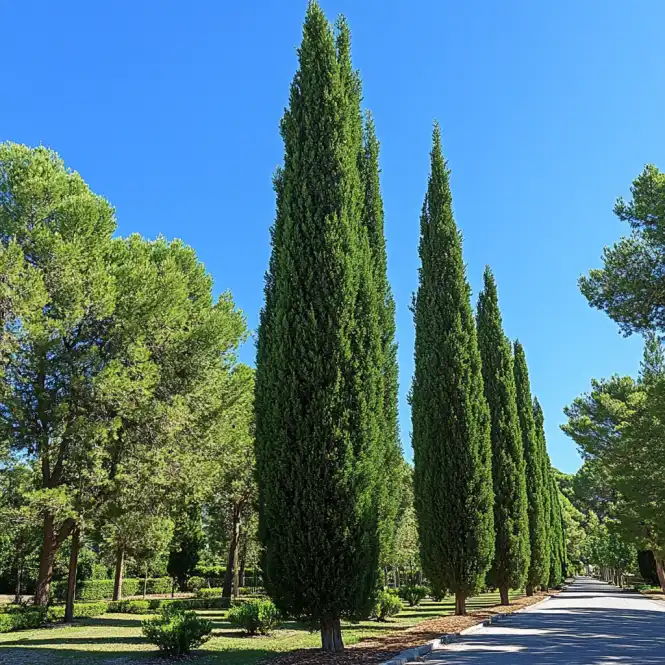If you’re dreaming of a backyard that feels secluded, peaceful, and shielded from prying eyes, privacy trees offer a natural and beautiful solution. Unlike fencing, which can feel harsh or artificial, planting trees creates a lush, living screen that matures over time — providing year-round coverage, noise reduction, and wildlife habitat. Whether you’re looking to block a busy road, reduce sound from nearby homes, or simply carve out a cozy backyard retreat, choosing the right privacy trees can completely transform your outdoor space.
Before we dig into the best options, let’s explore why trees are more than just a landscaping trend — they’re a long-term investment in your comfort and curb appeal.
Table of Contents
Why Privacy Trees Are a Smart Landscaping Choice 🌲
Privacy trees do more than just create a barrier — they enhance your yard in ways fences simply can’t. Here’s why many homeowners are choosing trees over traditional structures:
🌞 Natural Beauty and Visual Appeal
Trees soften property lines and add depth, color, and texture to your outdoor space. Whether evergreen or flowering, they bring year-round charm and seasonal interest.
🛡️ Protection from Wind and Noise
A dense row of privacy trees acts as a windbreak and sound buffer, helping to reduce noise from nearby roads or neighbors — especially valuable in suburban and urban settings.
🐦 Wildlife Habitat
Trees support local biodiversity, attracting birds, butterflies, and beneficial insects to your garden. You’ll get more than privacy — you’ll create a mini-ecosystem.
🌳 Shade and Energy Savings
Tall, leafy trees help cool your home in summer and offer filtered light year-round. Strategic placement can reduce energy bills and make outdoor spaces more comfortable.
♻️ Sustainable, Eco-Friendly Solution
Unlike fences that may require synthetic materials or frequent replacement, privacy trees are long-lasting, biodegradable, and contribute to cleaner air.
✨ Pro Tip: Unlike fences, trees grow more valuable with time. The right species will flourish with minimal maintenance and offer lasting privacy for decades.
Choosing the Right Privacy Trees for Your Yard 🧭
Before you head to the nursery, it’s important to think beyond just how tall a tree can grow. The best privacy trees for your yard will depend on a few key factors:
🌍 Climate and Hardiness Zone
Not all trees thrive everywhere. Check your USDA Hardiness Zone and choose varieties suited to your region’s typical temperatures, rainfall, and soil type.
📏 Available Space
Some privacy trees grow up to 60 feet tall and 30 feet wide — perfect for open properties, but overwhelming for small suburban lots. For tighter areas, opt for compact or columnar species.
🛠️ Maintenance Level
Do you want a fast-growing tree that requires frequent trimming, or a slower-growing variety that needs less care? Factor in pruning, watering, and disease resistance.
🧱 Proximity to Structures
Avoid planting large-rooted trees near homes, driveways, or underground utilities. Many privacy trees do best with plenty of space to spread their roots and branches.
✅ Helpful Tip: Plant a mix of fast- and slow-growing trees to get immediate coverage while allowing longer-living varieties time to mature.
Now that you’re prepped, let’s explore the Top 11 Privacy Trees you can plant to create your perfect natural screen.
11 Best Privacy Trees for a More Secluded Backyard 🌿
1. Eastern Redcedar – Rugged & Reliable for Large Spaces
Height: 40–60 ft | Width: 10–20 ft | Zones: 3–9
If you’re looking for a hardy, low-maintenance evergreen that offers dense, year-round coverage, the Eastern Redcedar is a top contender. Its aromatic, reddish wood and thick foliage create a solid barrier that blocks views, reduces wind, and attracts songbirds.
- Excellent for large backyards
- Withstands drought, cold, and poor soils
- Plant 15–20 feet apart for best coverage
- Natural resistance to pests and disease
Ideal for: Rustic or natural-style landscapes.
2. Weeping White Spruce – Elegant Vertical Privacy
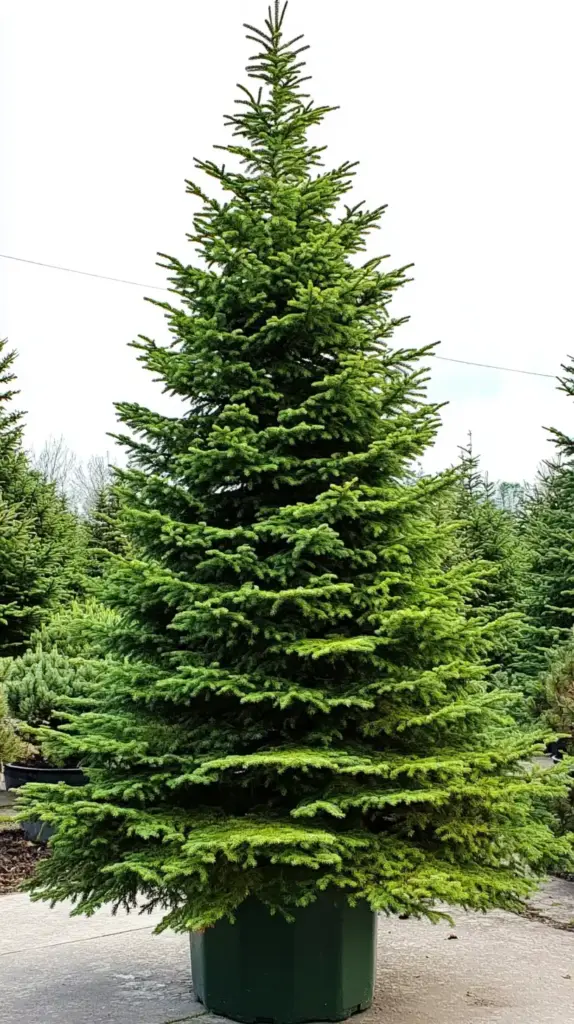
Height: 30–50 ft | Width: 6–10 ft | Zones: 2–9
With draping, blue-green needles and a narrow silhouette, the Weeping White Spruce offers graceful screening in smaller spaces. It’s cold-hardy, long-lived, and striking as a standalone specimen or planted in rows for privacy.
- Unique cascading form adds charm
- Thrives in cold climates
- Drought-tolerant once established
- Grows 1–2 feet per year
Ideal for: Northern regions and ornamental gardens needing vertical interest.
3. Leyland Cypress – Fast-Growing Evergreen Wall
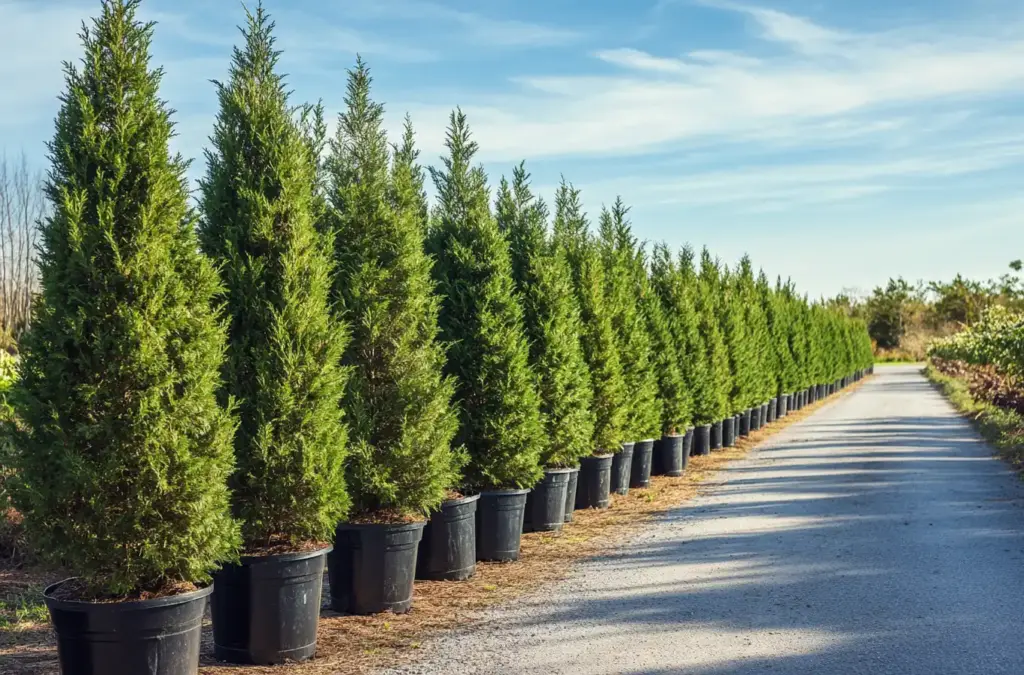
Height: 40–70 ft | Width: 15–30 ft | Zones: 6–10
Few privacy trees grow as quickly as the Leyland Cypress, making it a favorite for homeowners wanting fast results. When planted in rows, it forms a lush green wall that muffles sound and shields your yard within just a few seasons.
- Grows up to 3–5 feet per year
- Tolerates salt, pollution, and some drought
- Needs well-drained soil
- Space 6–10 feet apart
Ideal for: Coastal areas and large suburban lots needing rapid coverage.
4. Spartan Juniper – Sleek and Compact for Smaller Yards
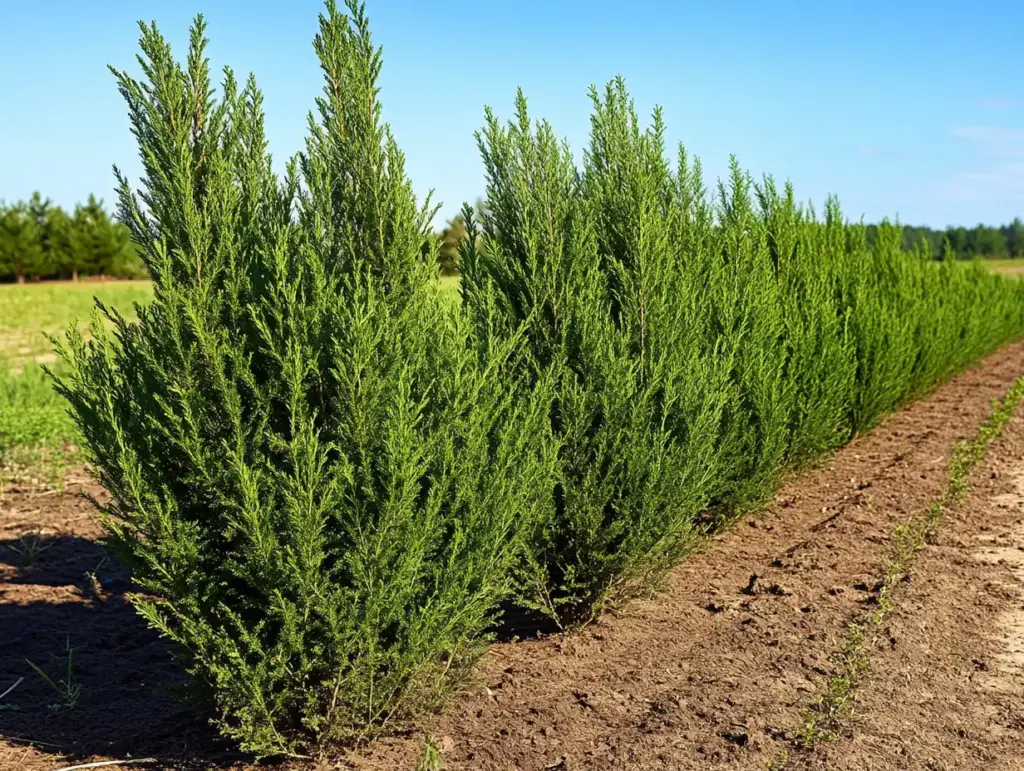
Height: 15 ft | Width: 3–5 ft | Zones: 5–9
Short on space? The Spartan Juniper is an excellent choice for tight areas, with a strong upright growth habit and rich green foliage. It provides reliable privacy without overwhelming your yard.
- Maintains a neat, uniform column shape
- Requires little pruning
- Thrives in full sun and well-drained soil
- Drought-tolerant and low-maintenance
Ideal for: Contemporary, Mediterranean, or minimalist gardens.
5. Sky Pencil Holly – Ultra-Slim Vertical Screen

Height: 8–10 ft | Width: 2 ft | Zones: 5–9
As its name suggests, the Sky Pencil Holly grows in a tight, vertical column — making it one of the best privacy trees for patios, walkways, or narrow borders. Bonus: its foliage is soft, not spiny.
- Great for container planting
- Perfect for tight or urban spaces
- Adaptable to different soil types
- Requires minimal shaping
Ideal for: Small backyards, decks, and urban landscaping.
6. Green Giant Thuja (Arborvitae) – Fast & Full Coverage
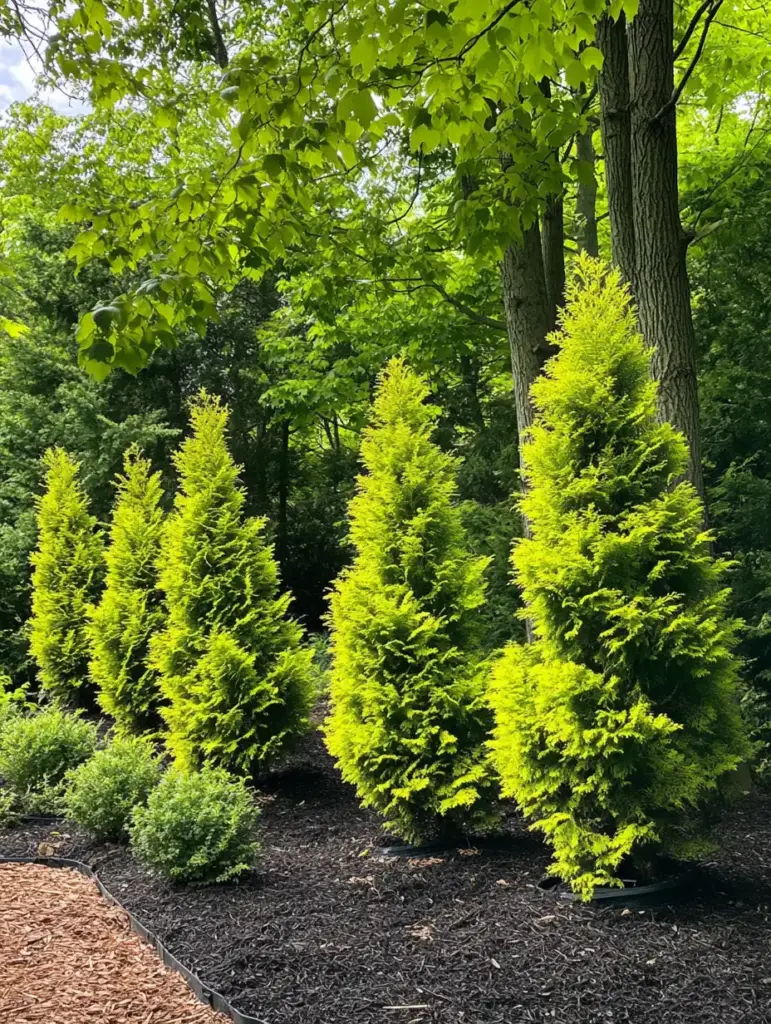
Height: 30–40 ft | Width: 5–8 ft | Zones: 5–9
Renowned for rapid growth and lush evergreen foliage, the Green Giant Thuja is a top-rated privacy tree for good reason. It forms a dense, uniform hedge with little effort.
- Grows 3–5 feet per year
- Tolerates heat, humidity, and drought
- Pest- and disease-resistant
- Little pruning required for shape
Ideal for: Creating a full privacy hedge in just a few seasons.
7. Emerald Green Thuja (Arborvitae) – Slender Beauty for Smaller Spaces
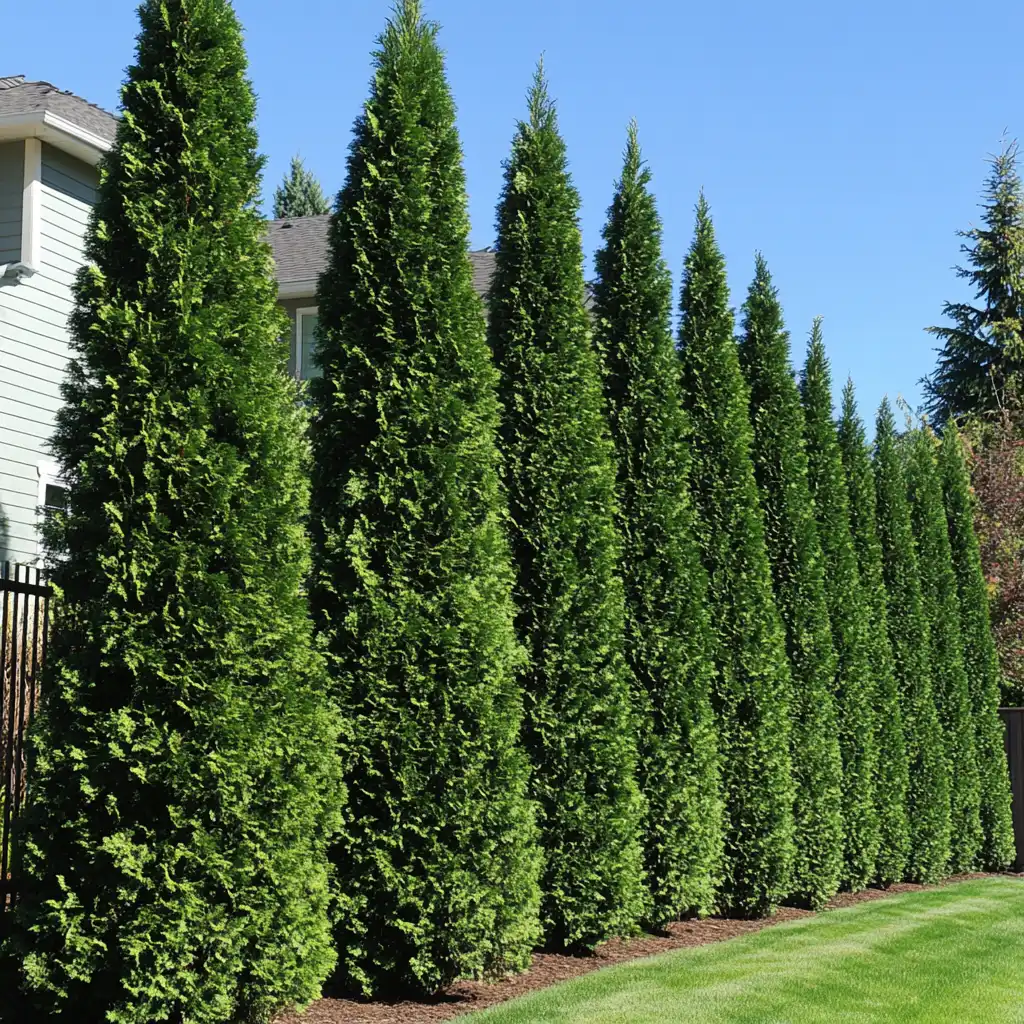
Height: 12–14 ft | Width: 3–4 ft | Zones: 3–8
If you like the Green Giant but need something smaller, the Emerald Green Thuja delivers. Its tidy, conical shape and moderate growth rate make it ideal for tight borders and foundation planting.
- Grows 6–9 inches per year
- Dense foliage forms an elegant screen
- Excellent snow and cold tolerance
- Plant 2–3 feet apart for a hedge effect
Ideal for: Suburban gardens, side yards, and decorative borders.
8. Flowering Dogwood – Colorful Privacy with Seasonal Interest
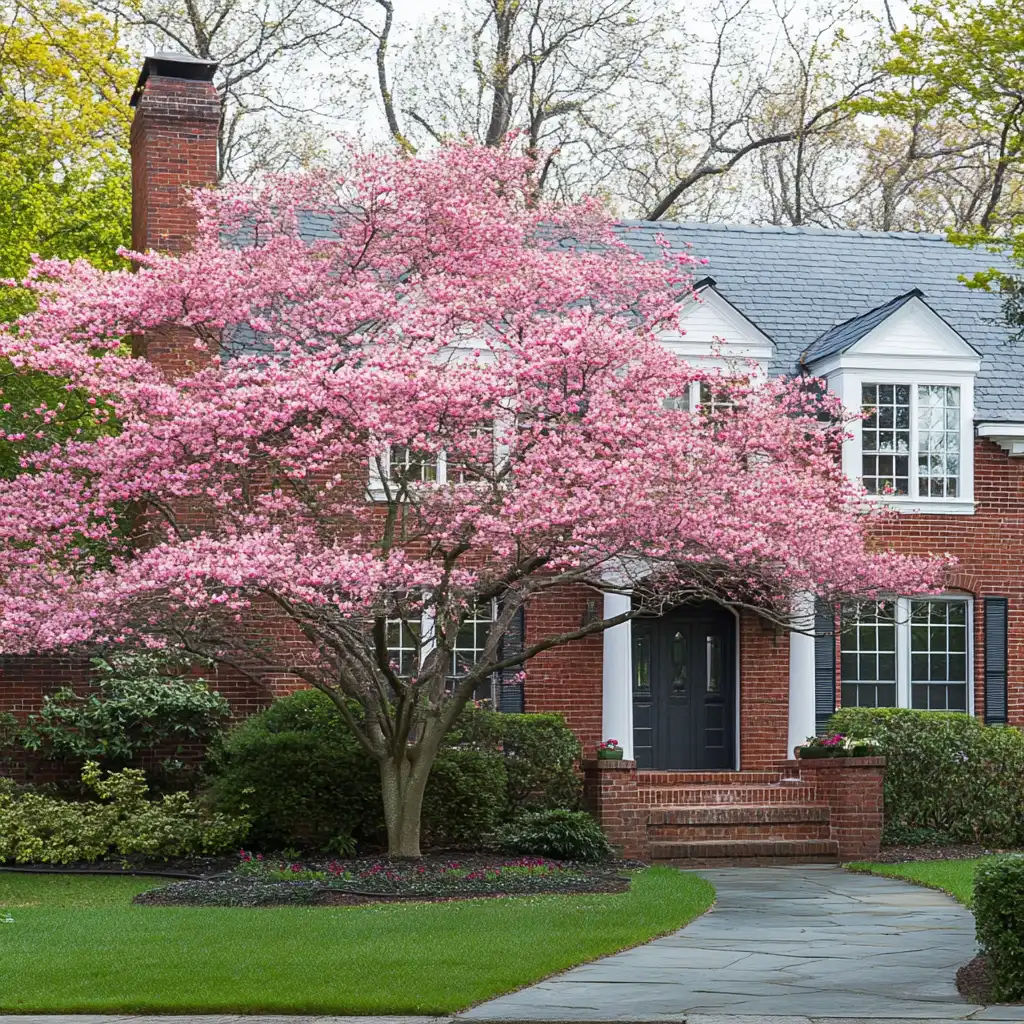
Height/Width: 15–25 ft | Zones: 5–8
For those who want both privacy and seasonal flair, the Flowering Dogwood offers soft screening with spring blooms and vibrant fall color. Its berries also attract local birds.
- Comes in white, pink, and red varieties
- Best for spot coverage or along fence lines
- Works well when mixed with evergreens
- Needs well-drained soil and partial shade
Ideal for: Traditional or cottage-style gardens.
9. Weeping Podocarpus – Tropical Elegance for Coastal Climates
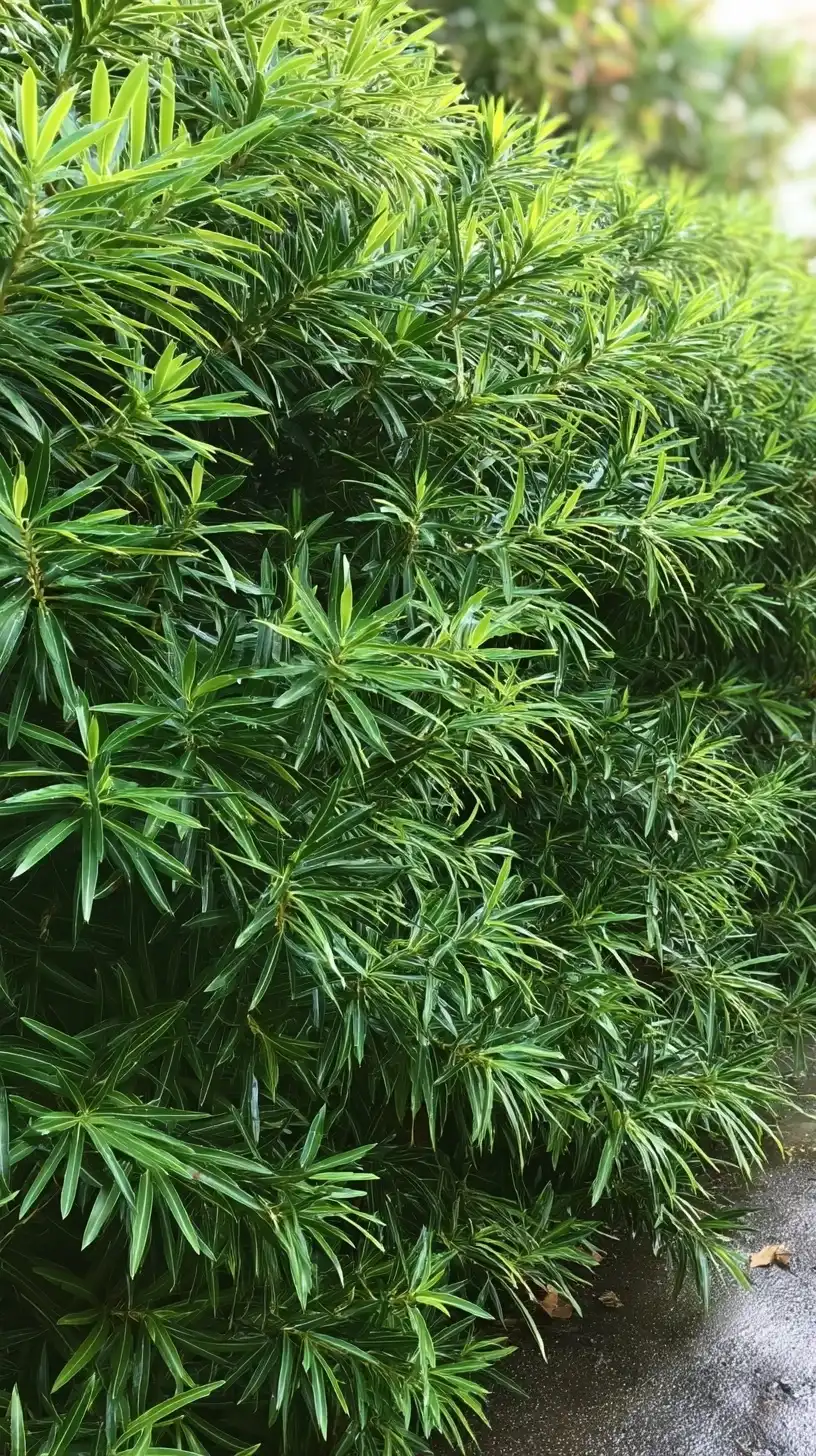
Height: 35–45 ft | Width: 10–20 ft | Zones: 9–11
The Weeping Podocarpus is a standout privacy tree for warm, coastal regions. Its soft, plush foliage and graceful drooping branches create a luxurious, lush screen.
- Tolerates heat, drought, and salty air
- Great for lining large properties
- Plant 5–10 feet apart for dense coverage
- Low maintenance once established
Ideal for: Southern states, coastal landscapes, and tropical-style yards.
10. Goldspire Ginkgo – Stunning Fall Color with a Narrow Profile
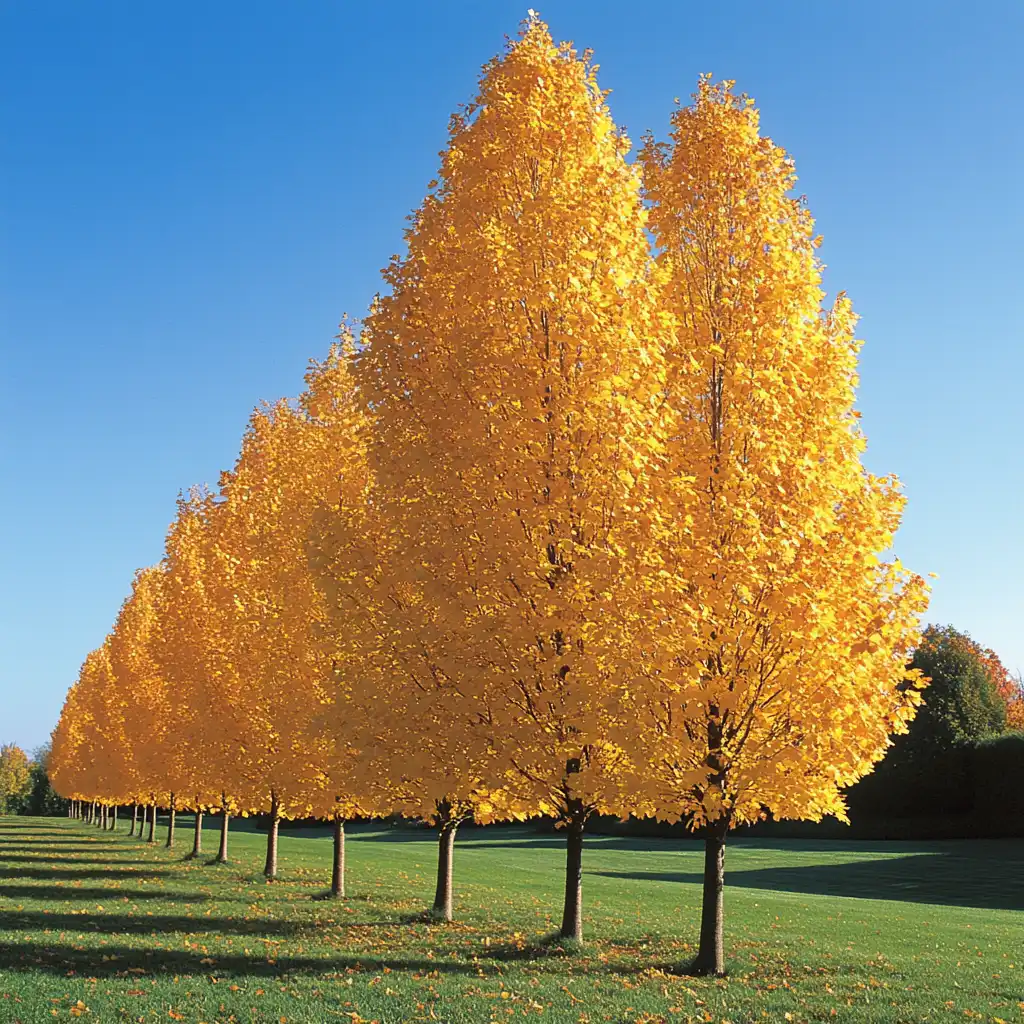
Height: 14–16 ft | Width: 5–6 ft | Zones: 4–9
The Goldspire Ginkgo stands out with its upright, pyramidal shape and radiant yellow foliage in autumn. It’s a fantastic pick if you want visual interest and privacy without taking up too much space.
- Non-fruiting and low-maintenance
- Smog-resistant and urban-tolerant
- Thrives in a variety of soils
- Provides vertical coverage in mid-sized yards
Ideal for: Zen gardens, urban backyards, or spaces where fall color is a priority.
11. Hybrid Willow Tree – The Fastest-Growing Privacy Tree
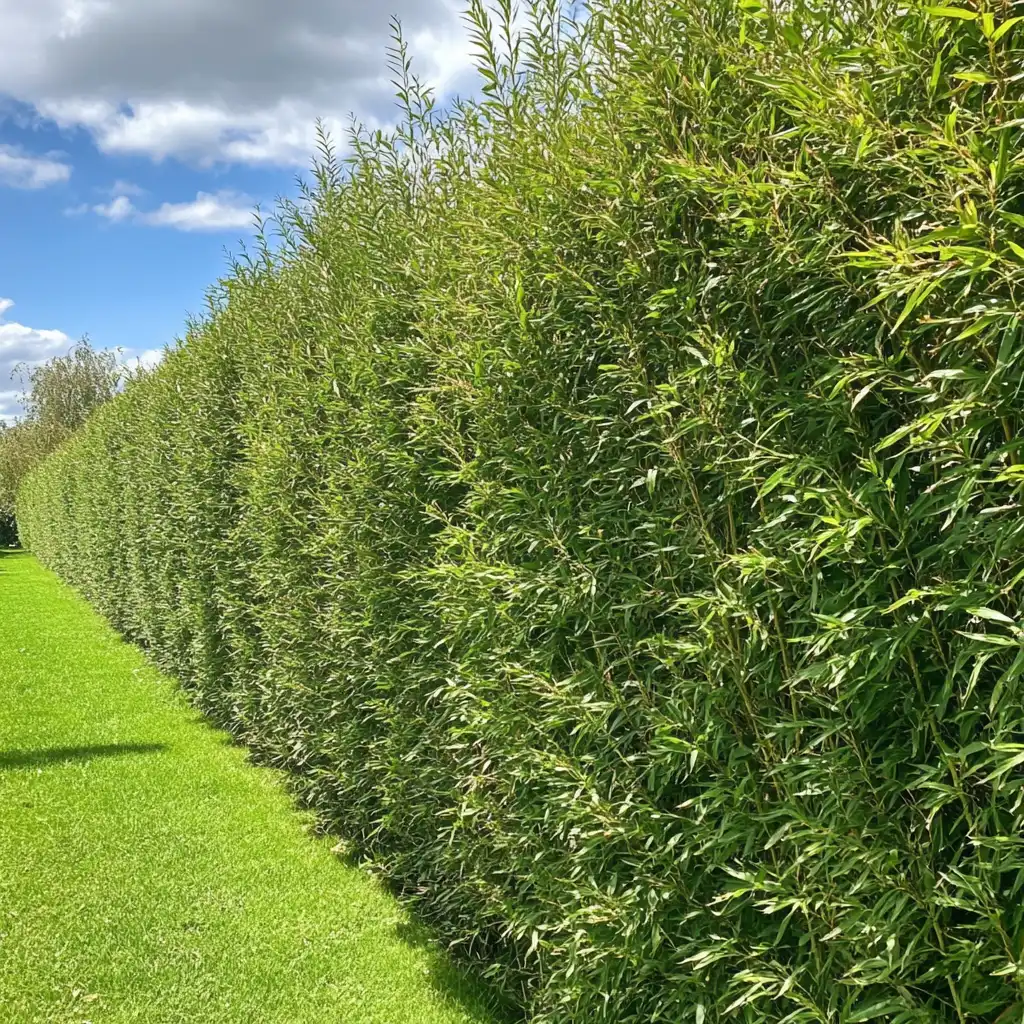
Height: 35–75 ft | Width: 20 ft | Zones: 4–9
When speed is your top priority, the Hybrid Willow Tree delivers. With a growth rate of up to 10 feet per year, it forms a dense green wall in record time — great for shielding noise, wind, or nosy neighbors.
- Grows fast: reaches full height in just 5 years
- Withstands cold, poor soil, and swampy areas
- Space 5 feet apart for a tight hedge
- Requires regular watering but is drought-tolerant when mature
Ideal for: Large yards needing rapid coverage and windbreaks.
Expert Tips for Planting Privacy Trees Successfully 🌱
Before you start digging, keep these tips in mind to ensure your privacy trees thrive and deliver the long-term benefits you’re looking for.
🧑🌾 Consult Local Experts
Soil types, microclimates, and pests can vary even within the same city. Visit a local nursery or consult a landscape professional to make sure your tree choices are compatible with your yard’s conditions.
🪜 Plan for Mature Size
A tree that looks small now may reach 60 feet tall with a wide canopy in just a few years. Always check the mature dimensions and leave enough space from fences, structures, and utilities.
🛠️ Prioritize Drainage and Spacing
Even drought-tolerant trees can develop root rot if the soil doesn’t drain well. Ensure you plant in a slightly raised area or amend the soil as needed. Follow spacing recommendations for each species to prevent overcrowding and disease.
🌳 Mix and Match for Best Results
Combining fast-growers like Hybrid Willow with longer-lasting, slower-growing varieties like Ginkgo or Thuja gives you immediate coverage and long-term beauty. A diverse planting also helps guard against pests and environmental stress.
🕒 Be Patient and Consistent
Trees take time to mature. Water regularly in the first few years, mulch to retain moisture, and avoid excessive pruning early on. With care, your living fence will reward you with privacy and beauty for decades.
With the tips and tree recommendations above, you’re now well-equipped to turn your outdoor space into a private haven.
🌿 Frequently Asked Questions About Privacy Trees
❓What are the fastest-growing privacy trees?
The Hybrid Willow Tree is one of the fastest-growing privacy trees, adding 6 to 10 feet per year. Green Giant Thuja and Leyland Cypress are also popular fast-growing evergreens.
❓How far apart should I plant privacy trees?
Spacing depends on the species, but a good rule of thumb is:
- Large trees (30+ ft wide): 15–20 feet apart
- Medium trees (10–15 ft wide): 5–10 feet apart
- Narrow/columnar trees: 2–5 feet apart
Always check the mature width and follow planting guidelines for airflow and growth.
❓Which privacy trees stay green all year?
Evergreens like Eastern Redcedar, Spartan Juniper, Green Giant Thuja, and Weeping White Spruce provide year-round foliage and coverage.
❓Do privacy trees attract wildlife?
Yes! Many privacy trees attract birds, pollinators, and other beneficial wildlife. For example, Flowering Dogwood produces berries that are a favorite of songbirds, and Eastern Redcedar offers excellent shelter.
❓Can I grow privacy trees in containers?
Some compact species like Sky Pencil Holly and Emerald Green Thuja can thrive in large containers, especially in small urban yards or on patios. Be sure the containers offer proper drainage.
❓Do privacy trees require a lot of maintenance?
Most privacy trees are low-maintenance once established. Evergreen varieties typically require:
- Occasional pruning
- Mulching for moisture retention
- Deep watering during dry spells (especially in the first 2–3 years)
Conclusion: Plant a Living Privacy Wall That Grows With You 🌳
Choosing the right privacy trees can turn your outdoor space into a personal sanctuary — one that not only looks stunning but also supports local wildlife and promotes a healthy environment. From fast-growing hybrid willows to graceful weeping spruce or compact evergreens like hollies and thujas, there’s an ideal tree for every garden size and climate zone.
With smart planning and consistent care — including choosing the right trees for fence lines and spacing them properly — your living privacy wall will flourish into a long-lasting retreat, offering peace, beauty, and protection right outside your door.


